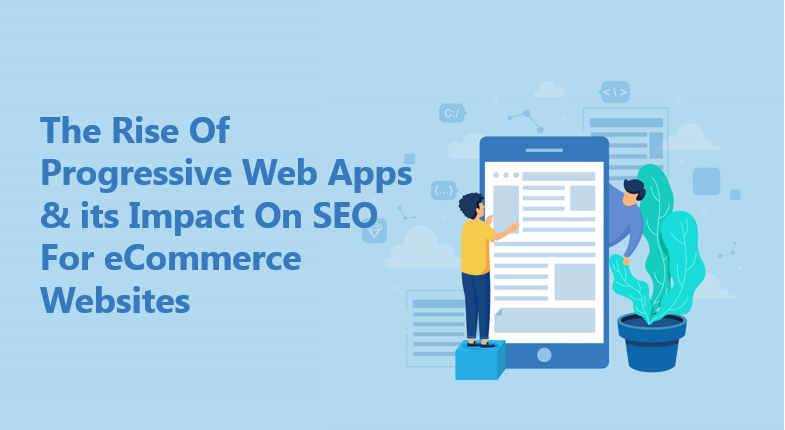
Now that we have rung in the New Year, one thing is for sure – “mobile” is still very important for consumers and businesses alike! Let us tell you why:
Mobile is now seen as the first digital touch with consumers. It is undoubtedly the new battleground for businesses, and eCommerce brands specifically are leveraging that in a significant way. They are continually looking for new ways to target and engage their customers.
That’s where Progressive Web Applications (PWAs) enter the picture.

(Source – https://www.applozic.com/blog/wp-content/uploads/2018/09/PWA.png)
Google introduced the PWA technology in 2015 with an aim to create an enhanced website with an app-like functionality, and thus combat the constant problem of app fatigue and poor app discover rates.

The technology is known for a gamut of benefits, including:
1) Improved loading experience
Mobile websites that take more than three seconds to load have already lost 53% of their traffic. To add to it, a 100-millisecond delay can cost 7% of the conversion rate on the website, and that is a number that businesses can’t ignore.
2) Active push notifications
The user gets notified on his or her device even when the progressive web application is not open in any browser. 2.7x more people are likely to open and click a push notification as compared to an email. The feature helps eCommerce brands lock in more conversions. Retail chains like Lancome and Starbucks are known for their excellent PWA-enabled sites. Ever browsed through them?
3) Better internet discoverability
The end goal for any business is to get discovered by their customers. A progressive web app is easily discoverable by search engines because it’s full of content and if appropriately optimized, a web app can fetch good search results.
4) Offline usage
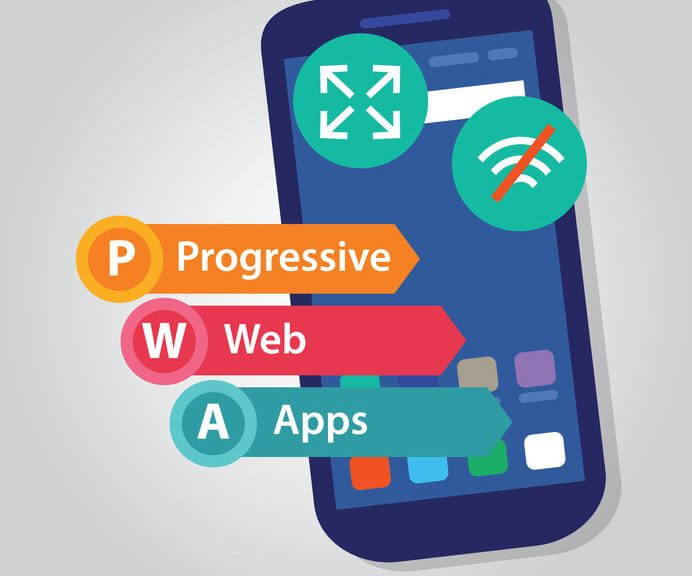
(source – https://brooklynseo.nyc/wp-content/uploads/2019/01/web-design-brooklyn-cg-media-692×576.jpg
Whatever content is downloaded on the web app works even when the device is not connected to any Wi-Fi with the support of a Service Worker which is a script that the browser runs separately in the background. This means your customers can even access your PWA-enabled site in locations with spotty internet connectivity.
5) App-like navigation
The UX and UI of a PWA are similar to a mobile app, but here, you don’t need to search for it in the app store and download it to use it. It’s fully responsive and eliminates any lags or jerky transitions to ensure a smooth user interaction.
A PWA is served via HTTPS to ensure the web content isn’t tampered with and to prevent snooping.

(source – https://cdn-images-1.medium.com/max/1600/0*6lsqh6xg_UzpRs9A.png
PWAs leverage technologies like Service Workers, Cache API, Web App Manifests to provide a web experience similar to native mobile apps.
In the last two years, they have proven to get 50% higher conversions for eCommerce brands and helped to improve the customer experience on the web app.
Recommended blog: Why Progressive Web Apps Are Important for Businesses?
George.com, Alibaba, Jumia, eXtra, MakeMyTrip and Flipkart are some of the most popular global brands in the eCommerce industry to have launched a PWA-enabled website. Social sharing platform Pinterest observed an increase in engagement by 60% and a rise in user-generated revenue by 40%.
So how does a PWA affect SEO? In more ways than you can imagine.
1) If an eCommerce PWA, serving contents from multiple resources, uses rel=canonical tags, it avoids any content violations.
2) If a web app page is available through a specific URL that does not make use of any fragment identifiers (#), Google crawls that page often which further helps in search rankings.
3) To ensure that the content of each page on the web app is indexable, it is necessary to use the feature of server-side rendering (SSR). Google’s master tool called Fetch and Render tool tests how Google Bots see and index a page.
4) Since PWAS are identifiable as “apps” thanks to Service Workers and W3C Manifests, it helps search engines to find the progressive web applications better and faster.
5) The number of embedded resources on the pages of a web app is considerably less as compared to a desktop site. This helps in faster loading of the pages. No wonder PWAs load better and quicker!
1) Apple has always remained fresh and at the top of their game. However, the tech giant chose to ignore PWAs, when they first came into the picture. However, things have changed and how. Now even iOS devices support the technology as Apple feels PWAs have stood the test of time.
2) Google states PWA compliance standards have secured a perfect score of 100%. According to Mobile Marketer, the mobile conversions of online retailer Luxmart doubled and reached 1.24% since the launch of their PWA-enabled website.
3) Now that major tech companies like Apple and Google are wholeheartedly adopting the technology, it has convinced web developers around the world to write the coding of web apps just once and then deploy to different sites.
Wrapping up
Progressive web apps for Android and iOS are in the making on a massive scale in 2019 – for various industries, and eCommerce is no exception.
MobiCommerce, a progressive web app builder, completely understands if your customers don’t find it easy to purchase your products, you are losing sales to competitors. You need to be where your customers are! We will build a responsive, SEO-optimized PWA for your eCommerce business that enables more consumers to find you easily.
Looking for a one-stop-solution commerce solution? Contact us today, and a member of our staff will reach out to you at the earliest to learn about your requirements.
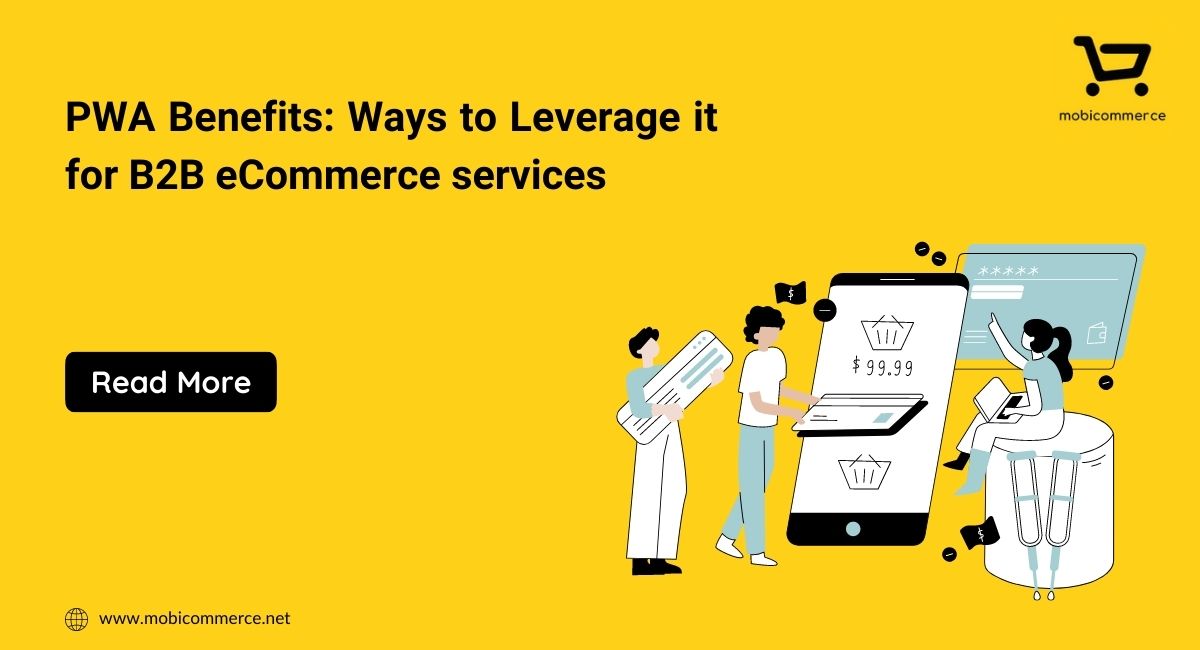
In order to improve user experience, businesses are increasingly turning to progressive web apps, which combine the best features of regular apps and websites. Ecommerce businesses which have created mobile-first PWAs have seen significantly faster page loading times, better conversion rates and improved engagement. On average, a website using PWA can increase speed performance by… Continue reading PWA benefits: Ways to Leverage it for B2B eCommerce services
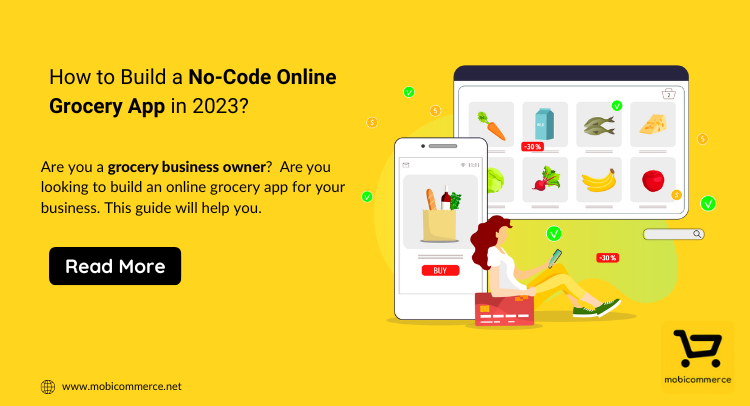
If you have a grocery store and you are looking to take your business to the next level, then this is the right time to invest in grocery mobile apps. A report by Oberlo suggests that online grocery sales in the US are expected to reach $160.91 by 2023. Not only this, the revenue continues… Continue reading How to Build a No-Code Online Grocery App in 2023?
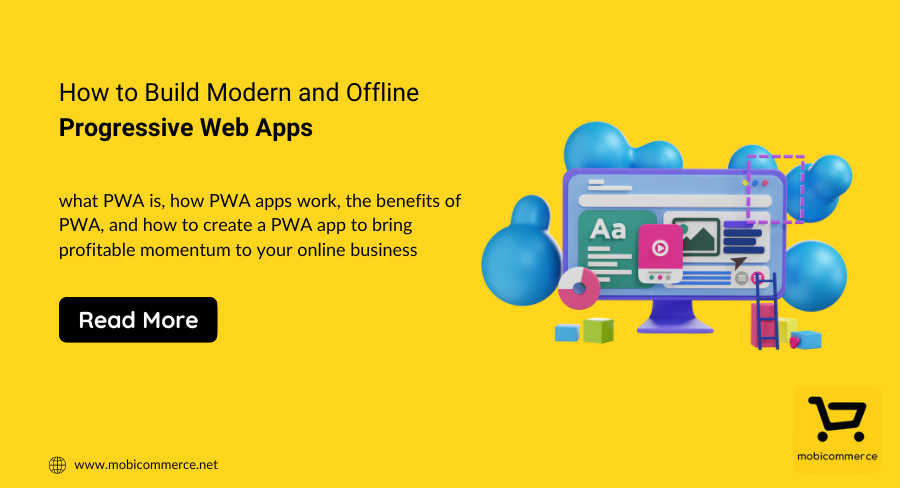
Most businesses create an app to establish their business in the digital world. But after some time, these businesses end up investing much more money by creating different versions and similar apps for different operating systems to stay relevant in the market. Later on, this choice of businesses becomes painful as they spend more money… Continue reading How to Build Modern and Offline Progressive Web Apps
Sign up for our newsletter and be the first to receive all the latest updates.
Request a callback from us by filling the form below.

Get your project estimate. Brainstorm business ideas. Book a demo. Get complete support and so much more!